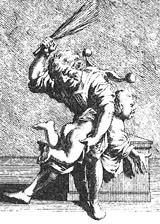
Desiderius Erasmus of Rotterdam was born on October 28th, 1469, in Rotterdam in the Netherlands. His father was a priest, an unfortunate circumstance that bedeviled him all his life. His childhood was nondescript, but apparently he was exposed to "the New Learning" (Latin and Greek classical literature) from an early age. His father had what was for the time a good library of books he had himself copied by hand (Remember, the printing press had just been invented and printed books were quite rare.)
He was educated by the Brethren of the Common Life, a group of laymen who banded together to practice the style of early Christianity. They lived in communes, studied religious literature, shunned ceremony and hierarchy, and placed great emphasis on education. They were tolerated by the Church but attracted considerable invidious attention from the established priestly orders. For the most part, however, their retiring lifestyle and immaculate reputation kept them immune from official retaliation. Their core values percolated into Erasmus’ character and shaped much of his future outlook -- although he was later to disparage their educational system. Despite his criticisms, he received one of the finest educations available in those benighted times.
His parents died of the plague while he was still a child, leaving him an illegitimate orphan -- not a good thing in 15th-century Europe. He was allowed to continue his education, but was pressured into joining a monastery. At first, the monastic life agreed with him, but within a few years he became disenchanted with the endless rituals, the ignorance of the monks, and their licentiousness lifestyle. By a stroke of good luck, he was allowed to leave the monastery to serve as Latin secretary for a bishop; after serving well in this capacity he managed to talk his patron into sponsoring him to the University of Paris, then the foremost institution on learning in Christendom.
Paris brought more disenchantment. The living standards of poor standards were abysmal, and the educational program was dominated by scholasticism, an philosophy that attempted to reduce religious belief to logical analysis. As one might imagine, the ambiguities and contradictions in a religion with 1500 years of history and a whole library of source material (the Old Testament, the New Testament, and the commentaries of the Church Fathers of the Roman era) were so vast that any rigorously logical treatment of all this material guaranteed all manner of truly precious logical contortions. After a few years of studying these absurdities, Erasmus came to the conclusion that scholasticism was a crock -- not a good conclusion for a student to draw if he wants to graduate.
At this point, his bishop, impatient with Erasmus’ extended stay at Paris, cut him loose, and Erasmus, in an act of surpassing courage and foolishness, struck out on his own. How he expected to survive on his own resources, with no marketable skills and no family connections, defies imagination. But he somehow made a living begging money from rich nobles and tutoring students. Indeed, so single-minded was his pursuit of education that he tottered on the brink of starvation in order to purchase books to pursue his studies.
He found his way to England, made many friends there, picked up a lot of money in the form of gifts, and lost it all at English customs upon leaving the country. He made it back to Paris, where, desperate for money, he wrote his Adages. Then it was off to Italy where he got his doctorate, revelled in the sophisticated learning of the Italian Renaissance, met and impressed many powerful magnates of the Church, and saw firsthand the decadence of the Church’s hierarchy. By this time he was becoming a public figure, a scholar well-known and respected for his erudition. But his career was just getting started.
